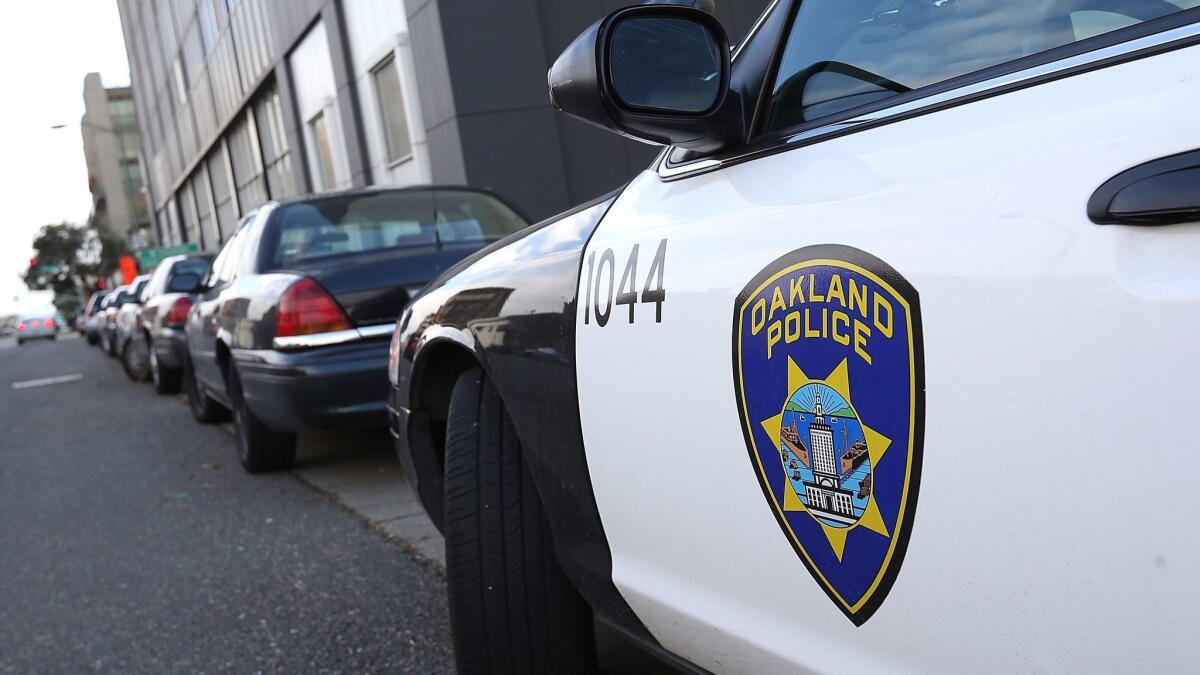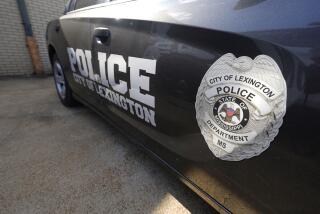Oakland police tend to treat black drivers with less respect than white ones, linguistic analysis shows

- Share via
After reviewing transcripts of traffic stops involving 981 motorists, Stanford researchers have come up with proof of something that many Americans have believed for a very long time: Police officers tend to treat black citizens with less respect than white citizens.
This is true regardless of the police officer’s own racial background, the researchers found. Nor does it matter whether the traffic stop occurs in a business district or residential neighborhood, or whether the crime rate in the area is high or low.
When you boil it all down, the inescapable conclusion is this: “Officers’ language is less respectful when speaking to black community members,” according to a report published Monday in the Proceedings of the National Academy of Sciences.
If this sounds like a trivial thing, the researchers assure you that it is not.
In any given year, more than 1 in 4 Americans who are old enough to drive have some kind of encounter with a police officer, usually as a result of a traffic stop. If these interactions go smoothly, the police build respect within their community. If they don’t, the public’s trust in law enforcement erodes, and citizens may become less willing “to support or cooperate with the police,” the study authors said.
The researchers, led by Rob Voigt, a graduate student in Stanford’s linguistics department, took advantage of the rapid spread of police body cameras to conduct their study. They obtained 183 hours’ worth of footage from the police department in Oakland, a city that is both large (population 420,005) and racially diverse (39% white, 26% black, 16% Asian, 6% two or more races and 26% Latino). The recordings were made in April 2014.
Voigt and his colleagues focused their attention on traffic stops involving 682 black drivers and 299 white ones. Once the footage was transcribed, they identified 36,738 distinct comments, or “utterances,” made by 245 police officers.
The study was conducted in multiple steps:
First, the researchers randomly selected 414 of the 36,738 utterances and paired each one with the driver comment that immediately preceded it. These exchanges were given to 70 study volunteers, who rated the degree to which officers were respectful, polite, friendly, formal and impartial. Each exchange was rated at least 10 times, and the volunteers weren’t told whether the motorist was black or white, male or female.
Even so, a clear pattern emerged: When the motorist was black, police officers were judged to be less respectful, less polite, less friendly, less formal and less impartial than when the motorist was white.
Officers’ language is less respectful when speaking to black community members.
— Stanford researchers, writing in the journal PNAS
Breaking things down, the researchers determined that 71% of the variance in the way black drivers and white drivers were treated could be traced to “Respect” with a capital R, a component of all five of the attributes examined.
Next, the researchers used computational linguists to determine the kinds of language that conveyed Respect (or lack thereof). Apologizing, expressing gratitude, offering reassurances, showing concern for a motorist’s personal safety and addressing drivers as “sir” or “ma’am” all contributed to a perception of Respect, among others. On the other hand, officers racked up negative scores for Respect by using informal titles (“my man”) or asking drivers to keep their hands on the steering wheel, to name a few examples.
Once the model had been “tuned” on the 414 exchanges, the researchers tested it on the entire sample of 36,738 utterances. The results revealed that officers conveyed more Respect when speaking to drivers who were white than with drivers who were black.
That disparity was apparent within the first 5% of an interaction between officer and driver, the researchers reported. Then it kept growing, since the amount of Respect shown to drivers grew over the course of a traffic stop, but it grew more quickly for white drivers than black ones.
The difference was so stark that in two-thirds of the cases, it was possible to predict whether the motorist was black or white based solely on the words used by officers.
The model gave researchers a chance to test out various theories about why the police treated black citizens less respectfully than white citizens. For instance:
- Was it because black drivers were pulled over for more serious offenses than white drivers? No.
- Was it a consequence of officers speaking more formally with white motorists and more colloquially with black motorists? No.
- Could the actions of a few “bad apple” officers account for the overall trend? No.
- Did this discrepancy arise only in cases that resulted in a citation or a ticket, but not in “everyday” interactions? No.
“We have found that police officers’ interactions with blacks tend to be more fraught … even when no arrest is made and no use of force occurs,” the study authors concluded. “The racial disparities in officer respect are clear and consistent, yet the causes of these disparities are less clear.”
Follow me on Twitter @LATkarenkaplan and “like” Los Angeles Times Science & Health on Facebook.
MORE IN SCIENCE
If there was ever life on Mars, Gale Crater could have hosted a variety of microbes, study says
After LIGO detects a third black hole collision, gravitational wave astronomy is here to stay
How a 5-sentence letter helped fuel the opioid addiction crisis







